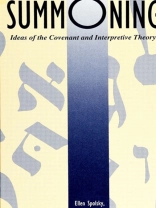This book explores the variety of ways that the Jewish understanding of the Covenant relates to the notion of a contract or a shared grammar as developed in recent structural and post-structural theory. The book enters the debate on the relationship beween a variety of open-ended forms of text interpretation and traditional Jewish interpretive practice, expanding and deepening that debate. Until now, the discussion has focused primarily on Midrashic interpretation; these essays balance the assumption of the openness of interpretation with an exploration of the concurrent restrictions on interpretation imposed by a covenant.
قائمة المحتويات
Acknowledgments
Introduction
The difficulties and advantages of assuming modularity of mind
Describing changes in literary systems
How can these claims be investigated?
1. Minds, Modules, and Models
The earliest and strongest version of the modularity hypothesis
Jackendoff’s modularity theory
The visual and the language modules
Gardner’s modularity theory
The crucial recognition of failure
Parrallel distributed processing models
Edelman’s Neural Darwinism
Dennett’s gappy consciousness
Summing up and hedging
2. New Genres: American Autobiography
Western American autobiography
The category fits the time
3. New Inferences: Reading
Hamlet and the Politics of Genre
Resisting genre
Categorization and inference
4. Women Readers and Women’s Rules
Fetterley’s reading and Fetterley’s rule
Gilbert’s reading without Fetterley’s rule
Categorization and transformation: Leaving room for the improbable
5. Intermodular Competition: Transformation and Inference
Metaphor and vision
Preference rules
Advantages and risks of multiple coding
6. Immobile and Immortal in the Monument of Literary History
Resistance to change: The conservatism if the experienced reader
The link between the Middle Ages and the Renaissance
Spearing’s dignity conditions and alterity conditions
The Bloom connection
7. Writing Literary History: Neoclassicism, Modularity, and the New Histories
Viewer-centered and object-centered understanding
Speaker-centered vs. public language
Interaction of the object-centered and the viewer-centered
Leaving space for the other
New historical criticism
Listening to others
8. The Dynamic of Freedom and Compulsion
The inevitability of contradiction
A Summary of the possibilities for change in the modular mind
Building culture into the survival of the species
Resisting reading
Notes
References
Index
عن المؤلف
Ellen Spolsky is Associate Professor at Bar-Ilan University, Israel and Director of the Lechter Institute for Literary Research.












